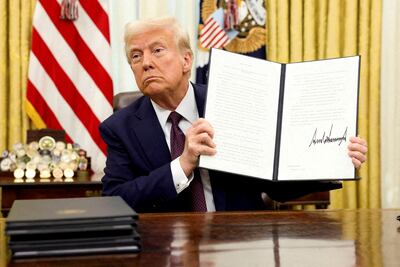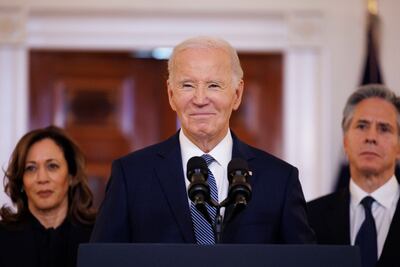The White House is seeking public input on artificial intelligence policy as the administration of US President Donald Trump tries to mould the growing sector. The move comes amid growing concerns from Americans over what AI might mean in terms of jobs.
A statement posted to the White House website on Tuesday called on Americans to “share their policy ideas” for AI: “The AI Action Plan will define priority policy actions to enhance America’s position as an AI powerhouse and prevent unnecessarily burdensome requirements from hindering private sector innovation."

Mr Trump's request for comments on AI policy comes after he signed directives repealing former president Joe Biden's executive order on AI, which the administration has criticised as stifling innovation in the sector.
Mr Biden's 2023 executive order sought “to ensure that America leads the way in seizing the promise and managing the risks of artificial intelligence” while also developing standards to help ensure AI systems are “secure and trustworthy".
The Republican Party said at its 2024 National Convention that it would repeal the “dangerous” order and also look to expand the use of cryptocurrencies.

While it pledged to ensure protections for AI, the Biden administration's approach to the technology was hardly hostile, and the former US president seemed to recognise the urgent need to maintain a lead in AI research. That push to maintain dominance resulted in a controversial AI diffusion rule that pushed to keep US technology from falling into the wrong hands.
So exactly how does the Trump administration seek to leave its mark on AI? For the most part, a hands-off approach seems to be a key difference.
Timothy Kneeland, a political science and history professor at Nazareth University in upstate New York, spoke of the differences between the two administrations' approaches to AI.
“One seeks to unleash the power of American ingenuity without consideration for the consequences; the other seeks to approach AI as something that must be carefully regulated and informed by ethical concerns and attention to civil rights and privacy,” Prof Kneeland said.
“We see reflected the opposites to technology in American society, with Trump and his technology oligarchs embracing it, and the progressives like former president Joe Biden and his allies in the liberal establishment mistrustful of unfettered AI,” he added.
He said that like many of Mr Biden's policies throughout his term in office, his approach to AI was “couched in caution".
“He recognised that unlimited AI could be reductionistic in its approach and, without careful guidance, could be used to create more bias and inequality in US society,” Prof Kneeland said.
He said that Mr Trump has allowed Elon Musk to use AI to help make cuts to the federal government through the Department of Government Efficiency.
“In co-operation with Doge, the US government is removing civil servants and using AI to study government spending,” he said.

Yet if there is a backlash to AI that somehow hurts Mr Trump's political capital, history suggests he may be quick to change. In December on Truth Social, he wrote a long post about his concerns regarding automation of US ports.
“I've studied automation, and know just about everything there is to know about it. The amount of money saved is nowhere near the distress, hurt or harm it causes for American workers,” he wrote.
During his speech at the AI Action Summit several weeks ago in Paris, Vice President JD Vance struck the middle ground, insisting that the Trump administration's policies would differ from Mr Biden's, but also hinting at a need to protect workers.
“We believe that excessive regulation of the AI sector could kill a transformative industry just as it's taking off and we'll make every effort to encourage pro-growth AI policies,” he told the summit, before turning to concerns about AI having an impact on labour.
“The Trump Administration will maintain a pro-worker growth path for AI so it can be a potent tool for job creation in the United States,” he added.
The deadline for public comments on Mr Trump's AI action plan is March 15.

